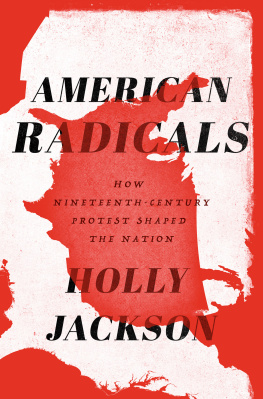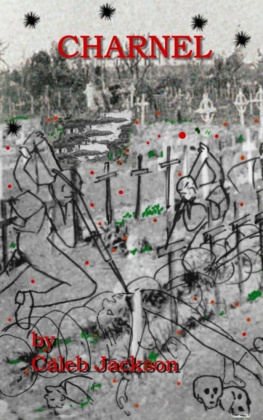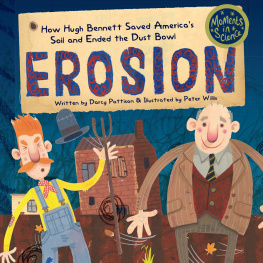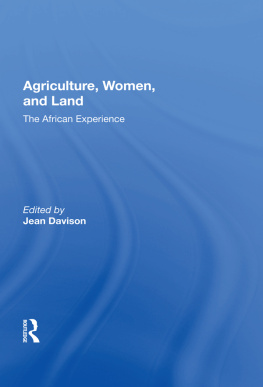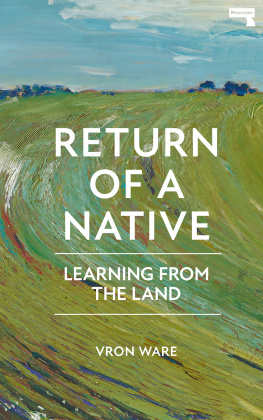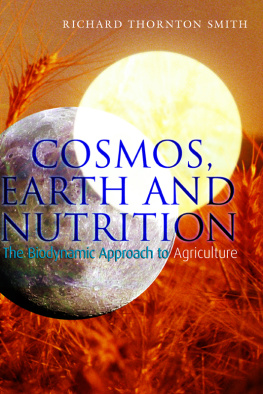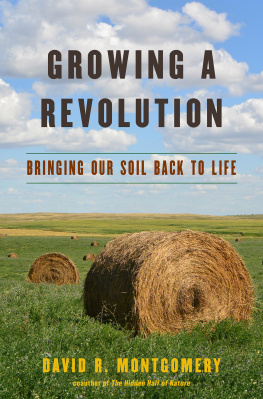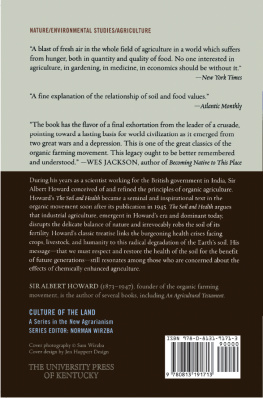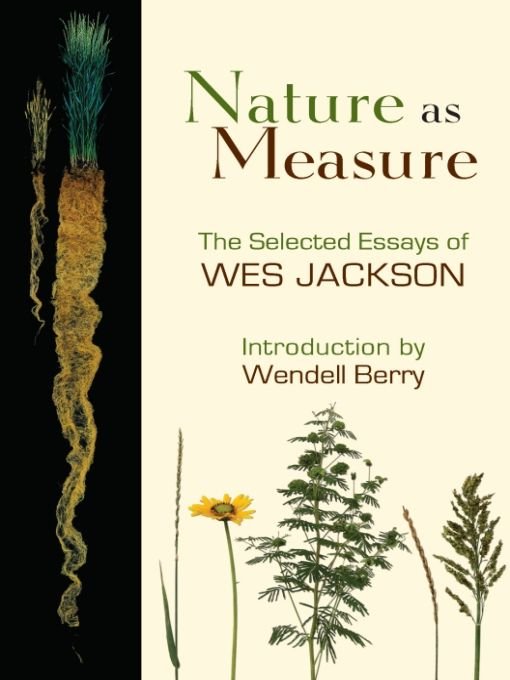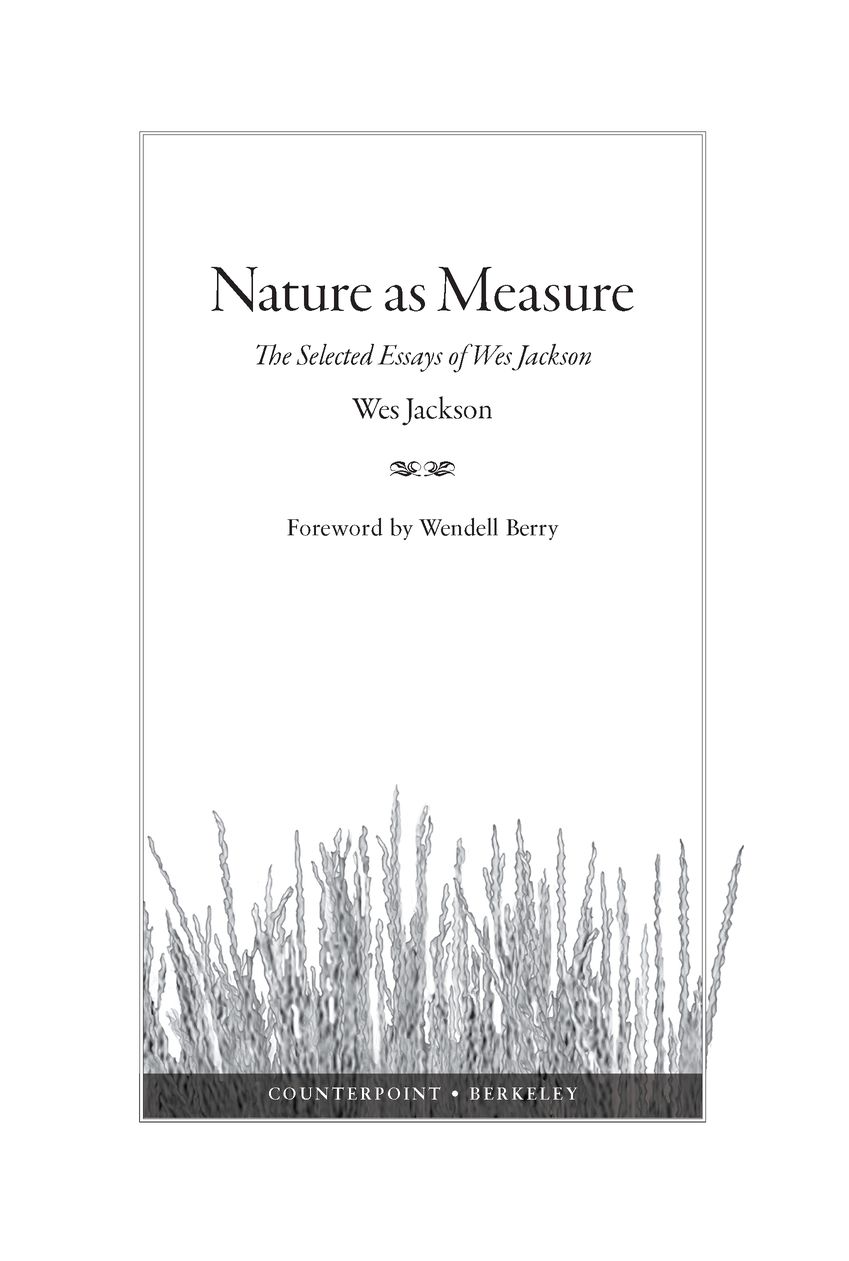Table of Contents
For Nettie, Ada, Abby, Katie, Jacob, Acelin, Eli, and Marley
Foreword: My Friends Book
BY WENDELL BERRY
IF WES JACKSON wanted to characterize his thinking about agriculture by refining it to its utmost gist, he probably could not do better than the following, from page 176 of this book:
Do not try to improve on this patch of native prairie, for it will serve as your standard by which to judge your agricultural practices. There is no higher standard...
And I could not better state the gist of my own thinking on the same subject than by quoting Wes, with a single qualification: Instead of referring to the native prairie of Wess region, I would refer to the native forest of my own, the original nature, the genius, of each place providing the necessary standard of economic performance.
Thus we differ. Thus we agree.
I have been in conversation with Wes, talking and writing, for more than thirty years. Sometimes our conversation has been public, and then often our hearers, succumbing evidently to the modern fascination with discord and hoping to stir up a fracas, want to know about our disagreements. And we have had to disappoint them. We are indeed different men, we come from different places and different courses of study, but we both wholeheartedly believe that of any form of human economy nature is the necessary, and the only proper, measure. The measure of our conversation, therefore, has been the health of nature. If we have agreed, or at times talked our way into agreement, this is why. If, for example, some economic practice diminishes the healththe capital, if you preferof nature, we agree that it is bad. That is the rule we have submitted to, as we have submitted also to the rule of human health in local communities. We have agreed absolutely that there is no tradeoff or acceptable cost that justifies any permanent damage to the ecosphere. This is the drawn line to which we return time and again in our thoughts and our talk, even when by doing so we must find ourselves guilty.
Maybe it is easy to disagree (sensationally!) on what is best for the pulpy structures of the government and the economy, but to agree on what is best for nature is not difficult. The effects of abuse are usually visible or, if not visible, measurable. Soil loss at present rates is often too clearly visible and is accountable in tons per acre. Pollution of water and air, sometimes visible, is always detectable and measurable by reliable means. To disagree about such harms, or their importance, people must be willfully deaf and blind.
For the remedies we must look to nature. Nature, as we well know, can be a rough customer. But in building and protecting the fertility of the soil, in preserving the health of the land and its communities of creatures, she is a model of patience and care. Her methods can be studied and learned. Since our health and wealth finally are indistinguishable from hers, we have no choice but to learn her ways, her limits, and her demands, and do our best to obey. There can be no rational disagreement about this. For human beings, always burdened by ignorance and selfishness, this learning and this obedience come hard. Wes and I share fully in the difficulty.
In our conversation, a phrase such as nature as measure signifies our mutual understanding of a paradigm of thought and work, also the supporting arguments and proofs that through the years have adhered to it. All of this exists simultaneously in our minds like pieces of string knotted together and rolled into a ball. That is simply the way phrases gather meaning in a long conversation between friends. This familiarity has granted me a keen pleasure in passing through these essays again. Perhaps other readers will share my excitement in seeing the unwound stringthe still necessary and lively pieces of evidence, the realizations, the instructions from bookswound again into a shapely coherence.
And perhaps other readers will read, as I do, with a sense of relief. We all are confronting inescapably the dire problems of soil loss, chemical pollution, the general decay of farming communities and cultures, and we are all living under the inverted, already wobbling pyramid of a cheap energy economy. And yet we read these essays with a growing enlightenment, a necessary kind of pleasure, for they are telling us that Wes and his colleagues at The Land Institute, their allies elsewhere, and perhaps with our own support or assistance, are competently addressing those problems and are at work on right-principled and therefore credible solutions.
Their solutions are not the short-term, quick-profit high wire solutions of corporate agribusiness. The solutions advocated and in preparation at The Land Institute will be a while in the making. They will be local and dispersed, producing profits neither immediate nor gigantic. They are authenticated, in part, by their requirements of devotion, endurance, patience, and an old-fashioned kind of personal modesty. The science of The Land Institute is thus akin to long-term work of any kind, but it is probably most akin to the effort of the best farmers to adapt their farming to their farms. Such work is not calculated to end in a cataract of dollars. Rightly understood, in fact, such work does not end. Human problems, in the context of nature, must be solved again and again in response to changes in weather, climate, and human understanding.
Though Wes Jackson is a scientist, these essays are notable for the considerable extent to which they are not, in the pure sense, scientific essays. The writing is unified by Wess constant mindfulness of his scientific vocation and task, but this does not inhibit at all his willingness to accept help from anywherefrom the sciences of course, but also from history, religion, philosophy, and the arts. His work is informed by the agrarianism he inherited, by the lore of family and neighborhood, by all he has learned, and all he has thought about what he has learned. He has read carefully, for instance, and thought long about the history of his region. Unlike conventional academic and corporate scientists, who plant their discoveries in the global marketplace to be used or misused by the world at large, Wes has troubled to know the place where his work and that of The Land Institute will come to earth.
If both local nature and the local human community are required considerations, then none of the present departments of study can be ruled out. And so Wes writes that the sustainable agriculturist begins with the notion that agriculture cannot be understood on its own terms... This derives from the axiom, unpopular in the schools, that nothing can be understood on its own terms.
The science to be found in this book, then, is science subordinated to the contexts of nature, locality, and local community. It is a science that understands itself as in service to those contexts. It is virtually a counterscience, pointedly unconventional, and yet it recommends itself to the good sense of any conscientious person.
It is a limited science, or a science conscientiously self-limiting. The corporatization of commerce, the commercialization of science, the universalization of the applications of sciencenone of these implies a limit, let alone the need for a limit. This, I think, is the import of Wess criticism of conventional science: Few scientists examine the assumptions of their method, and our scientists, with few exceptions, are free to do what is possible. To be free to do what is possible is to be free of any reliable standardand, typically, of the standard of natural healthby which the doing may be judged. And so the doing drifts inevitably toward the supremely unreliable standards of profit and power. This accounts for my own, by no means unique, doubt about the progress of conventionally unlimited science.




